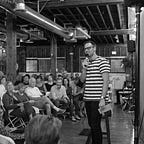A Theopoetic’s Manifesto (Charlatans Indeed)
Dreaming is encouraged when we’re young. Almost required. And no, I don’t mean any of that night-dreaming mischief, but rather that dreaming-during-the-day kind of magic. Finger-paints, sing-a-longs, pop-up-books, frol-ick-ing; these construct the very substance of childhood, and alive a child can become if he is encouraged to be. I know I was, once. And because of that, I have an almost spiritual connection with the term “imagination,” the Beatles’ Love Me do, parks and peanut butter sandwiches, and talking felt. Also,
Crayons,
Clarinets,
Where the Sidewalk Ends…or does it?
I could speak languages then that I can no longer speak: the tongues of melody, of make-believe, the very mouthpieces of God. In those days, ebony notes darted to-and-fro with wings strapped to their backs. But somewhere along the way, I lost the eyes to see them amuse one another, to play with them…or maybe I just need to find Joe Smith’s super special glasses or something. Where did it go? My vision, my hope, my dreams, that is.
Had they become entranced by those black-and-white times tables? Or was I bewitched under the spell of Sunday/School? Was it that suppressed kind of sexuality that only those young Christians know so well? Or maybe, it was that baseball coach who told me not to cry anymore…
“Shriek a voluminous primal Viking yell,” he said. “You’ve got to stop being so.”
“Well, on the field as it is in heaven,” I said.
I grieved by draping flanks of Veracity and victory over the skeleton of my youth, working toward a sturdier frame to carry that sinew of life-after-baseball, a life after, dreams. No longer soft, but now toned, steadied by the faith of empires and empiricists. Funny thing is, a body like that leads you to disavow your own embodiedness. Oh but if we could just run from our humanity, we wouldn’t have to invade both flesh-and-blood! We could just let Jesus be the fully human one so we don’t have to be, right? Nah.
It has taken me years to come back around to dreaming, to look it in the face, to let it stare back, to rememory it. In many ways, it has taken me leaving home. Make no mistake, I am not attempting to conjure up some kind of nostalgia here, nor is it a return to innocence. I have begun to dream again, however, but not thanks to prescriptions or propositions. I have found what I was looking for in the philosopher, the poet, the prophet. One might even say that this is what I mean by the theologian: that philosophizing, poetic, prophet. I certainly do not mean that type of theologian, those patrollers of minutia, those parsers of speculation.
I mean that type of theologian: the one whose words become a sort of lyrical baptism. You know, with water, fire, truth that soaks through to the marrow.
It’s my contention that, at its best, speaking of God should be poetry, or at the very least, poetic. Poetry is that universal language beyond language. It scrapes and digs at that deep, communal, preeminent voice. It punctures the heart first, and calls the head to descend that worthy descent into alignment. Honest writing must feel a lot like glossolalia, I’d imagine; that mystical tapping into some deeper Word beyond words, with its esoteric cloud-enshrouding-consciousness, probing it to spill over and whet the page, drenching it with the honor that can only come from speaking one’s truth. Ah yes, let’s do poetry.
Theology should also be prophecy, or at the very least, prophetic. That is, it must move forward. It must be deconstructive. Nothing can be off the table. It musk be risky. It must innovate. It must dream. No, it has to dream. It must, as Kurt Vonnegut says, exist on the edge, because
“Out on the edge you can see all sorts of things you can’t see from the center. Big, undreamed of things — the people on the edge see them first.”
All this God-speak must be brimming with possibility and potentiality, it must move toward “justice,” toward “unity.” And yes, I mean that in the Derridian sense. Love must be its base stream, after all, it is our beginning and it will be our end.
So, let us move beyond language as a container for God (for not unlike ashes, its interpretation falls all the way down), but still with language, let us stir something up in our persistence to speak in ways that are charged with a radical embracing of this life, of that life (the other), and not necessarily after-life. Let us be pioneers, heretics, and soothsayers, for charlatans indeed we all are in this conversation. Let us do whatever it takes to contribute, listen, and learn from the poetics of this wonderful multiplicity of God-gossip. And, let us be seduced into a romance by that event harbored within the name of those three letters: that spectral call to more, to be, to become, and to hope.
Like this:
Like Loading…
Originally published at atheopoetic.com on February 11, 2015.
